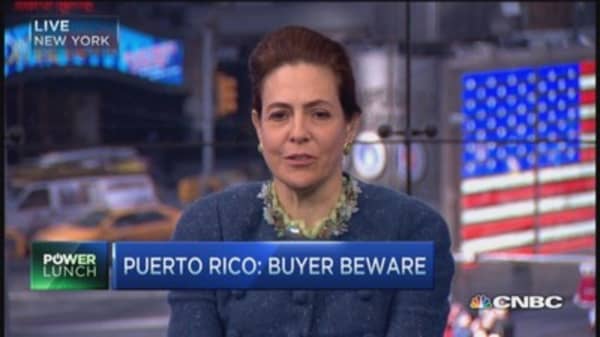Unsurprisingly, Puerto Rico's ring-fencing efforts have sent shockwaves through the markets. Ratings agencies downgraded virtually all Puerto Rican debt – guaranteed or not – suggesting that this maneuver signals a broader unwillingness to pay. In a vacuum, this may make sense, yet it's hard to square with other actions taken by Puerto Rico to improve their long-term financial situation.
Last week, a federal court threw out legislation that gave Puerto Rico the ability to put the debt of a few public corporations — including PREPA — into bankruptcy, further alarming bond markets. However, this ruling does not invalidate efforts to ring-fence. These bonds never had explicit recourse to the government and it's still the policy of the administration that the government guaranteed bonds are sacrosanct. It's far from clear how the courts will ultimately resolve this legislation, but the outcome won't change the prescription for Puerto Rico's return to fiscal solvency.
Read MoreOwn Puerto Rico bonds? Pro sees a 'silver lining'
The current administration is tackling its bloated public sector by working to increase revenues and decrease expenses. And it's succeeding: The budget shortfall has been reduced by 67 percent in the last two years and Puerto Rico is projecting a balanced budget in 2015, which would be the first in two decades, according to numbers released by the Puerto Rican government in July.
To increase revenues, Puerto Rico expanded its sales-tax base and has taken concrete steps to reduce tax evasion, while also working to attract businesses and additional taxpayers. It's worth noting that the island's nominal GNP – a reliable indicator for growth in its tax base – has increased every year since 2004. In comparison, Greece's nominal GDP is actually smaller today than it was a decade ago.
On the expenditure side, it has removed political hires at public corporations while concurrently signaling a resolve to stop using tax revenue to prop them up further. It also eliminated 35,000 government jobs and instituted a hiring freeze throughout the public sector.
Puerto Rico has also gone above and beyond most of the states and undertaken a comprehensive reform of its public pension plan, giving the system a giant nudge toward long-term solvency.
Read MoreItaly looks to teach Greece a lesson
These efforts are not indicative of a government looking to skirt its guaranteed obligations.
While the long-term outlook is undoubtedly improving, financial markets show some concern about the island's short- to medium-term liquidity. Fortunately, this issue seems to have been addressed by numerous large investors that extended credit for the next couple of years. It seems like a safe bet to make, not only because of the reforms but also because debt maturities through 2016 are only 15 percent of its tax revenue, which is more than manageable.
Puerto Rico's unique status is both a blessing and a curse: Its inextricable link with the United States provides easy access to capital markets, which can foment economic growth if used well or allow governments to avoid making difficult decisions if it chooses to do so. The fact that the island's government has taken the short-term pain of reducing spending, laying off workers, and expanding the tax base bodes well for the island's long-term prospects.




